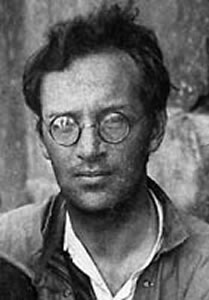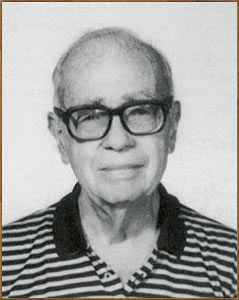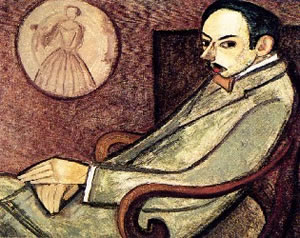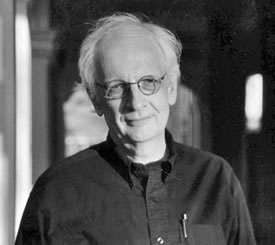|
De Russische schrijver Boris Andrejevitsj Pilnjak werd geboren in Oblast Moskou op 11 oktober 1894.Zie ook mijn blog van 11 oktober 2009.
Uit: A Year Of Their Lives (Vertaald door F. O. Dempsey)
To the north, south, east, and westin all directions for hundreds of milesstretched forests and bogs enveloped in a wide-spread veil of lichen. Brown-trunked cedars and pines towered on high. Beneath there was a thick, impenetrable jungle of firs, alders, wild-berries, junipers, and low-hanging birches. Pungent, deep-sunken, lichen- covered springs of reddish water were hidden amidst undergrowth in little glades, couched in layers of turf bordered by red bilberries and huckleberries.
With September came the frostsfifty degrees below zero. The snow lay everywherecrisp and dazzling. There was daylight for three or four hours only; the remainder of the time it was night. The sky was lowering, and brooded darkly over the earth. There was a tense hush and stillness, only broken in September by the lowing of mating elks. In December came the mournful, sinister howling of the wolves; for the rest of the timea deep, dreadful, overpowering silence! A silence that can be found only in the wastelands of the world.
A village stood on the hill by the river.
The bare slope descended to the water's edge, a grey-brown granite, and white slatey clay, steep, beaten by wind and rain. Clumsy discoloured boats were anchored to the bank. The river was broad, dark, and cold, its surface broken by sombre, choppy, bluish waves. Here and there the grey silhouettes of huts were visible; their high, projecting, boarded roofs were covered by greenish lichen. The windows were shuttered. Nets dried close by. It was the abode of hunters who went long excursions into the forests in winter, to fight the wild beasts.
2.
In the spring the riversnow broad, free and mightyoverflowed their banks. Heavy waves broke up the face of the waters, which sent forth a deep, hoarse, subdued murmur, as restless and disquieting as the season itself. The snow thawed. The pine-trees showed resinous lights, and exhaled a strong, pungent odour.
In the day-time the sky was a broad expanse of blue; at dusk it had a soft murky hue and a melancholy attraction. In the heart of the woods, now that winter was over, the first deed of the beasts was being accomplishedbirth. Eider-ducks, swans, and geese were crying noisily on the river.

Boris Pilnjak (11 oktober 1894 - 21 april 1938)
De Nederlands / Indonesisch dichter, essayist en geleerde.Gertrudes Johannes (Han) Resink werd geboren in Jogjakarta op 11 oktober 1911. Zie ook mijn blog van 11 oktober 2008 en ook mijn blog van 11 oktober 2009.
Landschapschildering
Uit dalen komen golven bovenstromen
en aan hun schuim ontkrult een wilde lucht
en uit dat zwerk valt dan een gouden vlucht
van vlinders en van vogels neer op bomen,
die wuivend buigen om een oud gehucht,
waar iedereen zijn tijd staat te verdromen
bij spel, muziek, goed eten en gerucht
van goden, die van verre bergen komen.
Op één der prauwen, die de zee doorvaren,
staat bij een zeil, met bloemen overschilderd,
een gaaf, naakt kind in die volmaakte rust,
die ieder mens in zich tracht uit te sparen
temidden van een wereld, die verwildert.
Kwatrijn
Houd als de houtsnijder, die een plastiekje hieuw
van een gewone vrouw, maar met een vissenkieuw
gevederd, niet van alles wat héél ver is en
héél schoon, maar wel van wat heel oud is en heel nieuw.

Han Resink (11 oktober 1911 4 september 1997)
De Franse dichter en schrijver Pierre Jean Jouve werd geboren op 11 oktober 1887 in Arras. Zie ook mijn blog van 11 oktober 2008 en ook mijn blog van 11 oktober 2009.
Lisbe
Des ressemblances nous ont égarés dans l'enfance
Étions-nous donc du même sang
Des merveilles se sont passées qui nous ont fait peur
Près des édredons de pleur et de sang rouge
Étions-nous du même sang quand je rencontrai ta blondeur
Avions-nous pleuré les mêmes larmes dans les cages
Et quels attentats en de secrètes chambres
Nous avaient faits aussi à nu que nos pensées?
Ô mort il me revient des sons étranges
Ô vive et un peu rousse et la cuisse penchée
Tes yeux animaux me disent (velours rouge)
Ce qu'un génie n'ose pas même imaginer.
Adieu
III
Adieu. La nuit déjà nous fait méconnaissables
Ton visage est fondu dans l'absence. Oh adieu
Détache ta main de ma main et tes doigts de mes doigts arrache
Laissant tomber entre nos espaces le temps
Solitaire étranger le temps rempli d'espaces;
Et quand l'obscur aura totalement rongé
La forme de ton ombre ainsi qu'une Eurydice
Retourne-toi afin de consommer ta mort
Pour me communiquer l'adieu. Adieu ma grâce
Au point qu'il n'est espoir de relier nos sorts
Si même s'ouvre en nous le temple de la grâce.

Pierre Jean Jouve (11 oktober 1887 8 januari 1976)
Portret door Henri Le Fauconnier
De Duitse dichter, schrijver en vertaler Hans Schiebelhuth werd geboren op 11 oktober 1895 in Darmstadt. Zie ook mijn blog van 11 oktober 2009.
DAS MÄDCHEN DES FLUSS-SCHIFFERS
Das Wasser vom Flitzfluß ist flink wie ein Pfeil.
Ein Boot auf dem Flitzfluß saust dahin
Als hätte es Flügel.
Zehn Tage nur braucht es für dreitausend Meilen.
Und Du gehst, mein Lieber -
Oh weh, wie viel Jahre, ehe Du heimkehrst?
Li-Po
SEIN LIED
Er singt sich selber in Schlaf.
Seine Mutter, über ihn gebeugt,
Schilt ihn.
Aber er will zuerst
Sein Liedchen in Schlaf singen.
Chang-Wu-Ken

Hans Schiebelhuth (11 oktober 1895 14 januari 1944)
Darmstadt, Luisenplatz (Geen portret beschikbaar)
De Amerikaanse dichter, essayist en vertaler Richard H. W. Dillard werd geboren op 11 oktober 1937 in Roanoke, Virginia. Zie ook mijn blog van 11 oktober 2008 en ook mijn blog van 11 oktober 2009.
Uit: Going Out Into the Crazy: Some Thoughts About Real Writing and Real Reading
In much the way that a minister will build a sermon upon a selected biblical text, I am today going to deliver what might be called a secular sermon or meditation on a sentence by Edgar Allan Poe from his essay "Peter Snook"not the actual sentence, mind you, but an inaccurate version I quoted to Erin Pope, one of my students, the other day while we were discussing the way writing is written. I'll tell you what Poe actually wrote a bit later, but here is the sentence as I misquoted it at the time: "To originate is carefully, patiently, and lovingly to combine." I would like to use that newly minted (or recombined) Poe sentence to talk to you a bit this morning about the mysterious process of writing, reading, and the creation of meaning by writing and reading.As I remember it, when I was an undergraduate at Roanoke College and a student in Professor Matthew M. Wise's course, English 44: Shakespeare's Comedies, I made a discovery. It was a discovery that I found very useful at the time as a device for getting through that difficult course unscathed, but I did not really come to understand its implications and larger meaning until maybe twenty years laterwhich I suspect is about the time it takes to figure out what you actually learned in college apart from what you thought you learned. Or maybe I was just a slow study. But, be that as it may, I thought that I would talk about that discovery today and use it to discuss briefly why some of us write what Vladimir Nabokov would call "real writing," or to use a somewhat less aggressive term, imaginative literature, and why all of us should read it with the same care, patience and love with which it was written.

Richard H. W. Dillard (Roanoke, 11 oktober 1937)
11-10-2010 om 17:18
geschreven door Romenu 
Tags:Boris Pilnjak, Han Resink, Pierre Jean Jouve, Hans Schiebelhuth, Richard H. W. Dillard, Romenu
|

